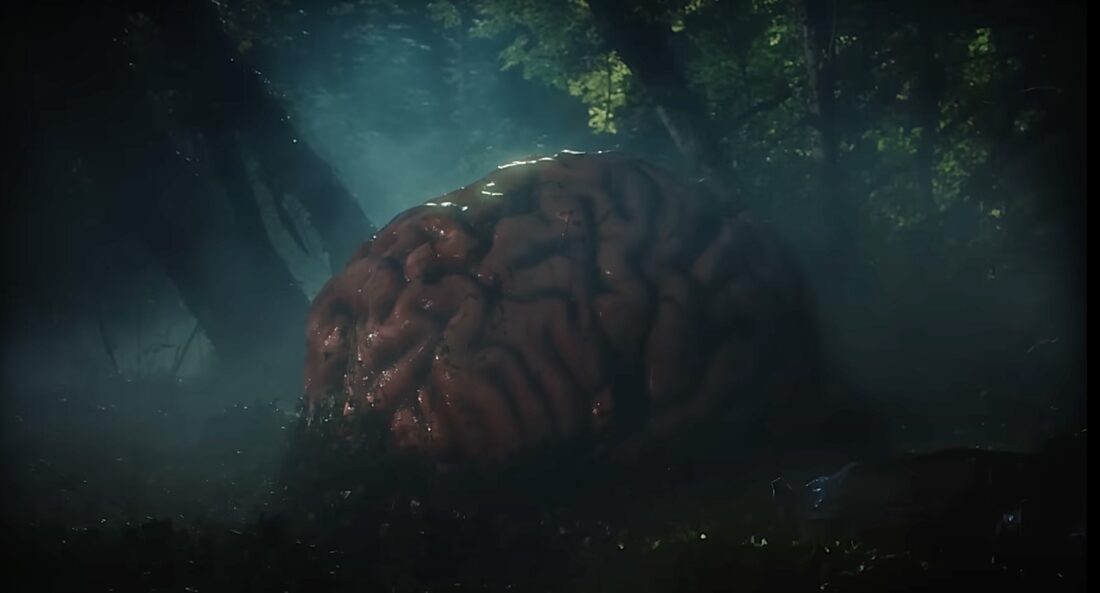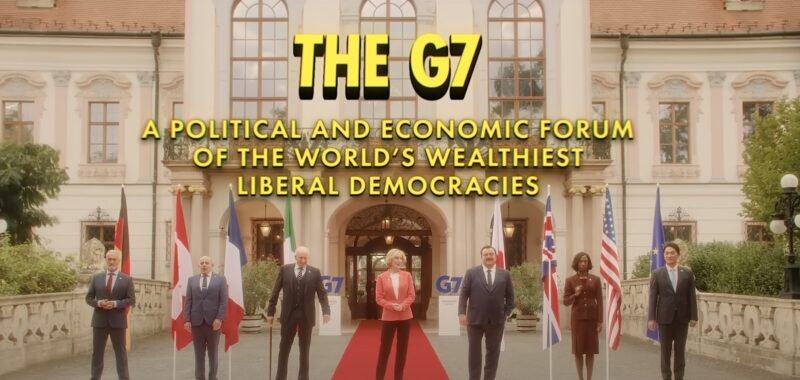Rumours is a fascinating new sci-fi adjacent film written and directed by Guy Maddin, Evan Johnson, and Galen Johnson. It’s kind of about climate destruction, but it also touches on AI, self-immolation-as-protest, alien intelligence, and secret elite pedophilia rings, but somehow it all comes together into an experience that is frustrating and infuriating—in a good way.
It’s also startlingly funny, in that it keeps veering in unexpected directions that function as cinematic rib pokes. I saw Rumours at the New York Film Festival a few weeks ago, and listening to a room full of film critics giggle when the movie suddenly presented us with a GIANT GLOWING ALIEN BRAIN gave me hope for the future. (Kind of.) I guess I’m trying to say that I like movies that are game. I like creators that grab their audiences by the hand and lead them down weird paths to tell their stories, and trust us to walk with them with wide open eyes.
I try not to look at art as the eternal search for the new. It’s entirely possible to take a “love song” or a “war story” and make art out of it, even though people have been singing love songs and telling war stories for thousands of years. “Francesca” is a story about a boy and girl in love, based on a real incident that happened in the mid-1280s, and referencing Dante’s retelling of the story, written in the early 14th Century. And yet, if Hozier’s update on the story comes on my iPod, I will turn it all the damn way up. And possibly cry. Saving Private Ryan is a bundle of cliches and platitudes, but Spielberg and his crew and actors commit so utterly to the idea that these are real things, happening to real young men, who are really terrified unto death, that the film becomes harrowing to watch.
I bring this up because Rumours is new. It’s taken me a few days to sort through my thoughts. There were points when I wasn’t sure if it worked, but now I think that doesn’t matter. It did things I didn’t expect, and it set up an outcome and went for it, and it talks about Real Things.
I’ve thought a bit about Rumours in relation to Don’t Look Up, a movie I didn’t like too much because I thought it was a little too on the nose, particularly when dealing with what Jeff VanderMeer calls a hyperobject. In Don’t Look Up, writer and director Adam McCay wanted to talk about climate destruction, using the metaphor of an asteroid barrelling towards earth, to work through how a small group of activists try to save humanity while governments and officials and media elites ignored the problem until it was too late. It’s the film equivalent of Thom Yorke screaming “We’re not fearmongering—this is really happening”, and they’re all right. It is really happening. As I write this a hurricane that is as strong as it’s mathematically possible to get in the Gulf of Mexico is making landfall in the place I grew up. I don’t know if my hometown will be standing tomorrow.
And maybe this sounds silly, or shallow, but I appreciate that Maddin, Johnson, and Johnson attempt to tackle both the despair and absurdity of life right now in Rumours. If you’re going to deal with something this huge, you have to swing harder. If you’re dealing with nuclear threat you gotta go full Oppenheimer—or full Strangelove. And I think Rumours might be a bit more successful than Don’t Look Up in dealing with climate destruction, because it becomes so absurd that it leaves room for the audience to come to it, and think about it, rather than feeling like they’ve been bludgeoned. (Not to bag on Megalopolis again, but I’ve been thinking about Rumours for two weeks now. I only think about Megalopolis when Demi Adejuyigbe posts another “go back to the cl-u-u-u-u-u-u-b” remix.)

The plot, if you want to call it that: A group of world leaders (and assistants, handlers, and cater-waiters) gather in a German manor for the G7 conference. Each leader becomes a stand-in for their respective country, and all are hilarious. Cate Blanchett is Hilda Ortmann, the Chancellor of Germany, hypercompetent and amused by the incompetence of most the others. Nikki Amuka-Bird is Cardosa Dewindt, the Prime Minister of the United Kingdom, hypercompetent and annoyed by the incompetence of most of the others. Roy Dupuis is Maxime Laplace, the Prime Minister of Canada, and he’s Bronte’s Heathcliff by way of an aging IKEA-catalogue hipster, with striking looks, flowing locks, and a poetic, tortured soul. (He’s had affairs with most of the female characters, and his career is threatened by a hilariously mundane “carried interest scandal”.) Charles Dance is Edison Wolcott, the President of the United States, ancient, exhausted, and sporting an inexplicable British accent. Denis Ménochet—as Sylvain Broulez, the President of France and a blustering academic with impeccable taste—spends most of the film being rolled around in a wheelbarrow. Rolando Ravello as Antonio Lamorte, the Prime Minister of Italy, is hapless, sweet, and carrying prosciutto for everyone to snack on. Takehiro Hira as Tatsuro Iwasaki, the Prime Minister of Japan, is the only one aside from the two women who actually at least tries to work on the statement, but his bullet list isn’t going to accomplish much. Finally Alicia Vikander plays the president of the European Union who turns up halfway through the movie to tell the others that they need “a new language” to usher in a new age, and it seems like she’s been possessed by an alien consciousness—until they figure out she’s just speaking Swedish.
Now if you read all of the that and find it ridiculous in a good way, you’ll enjoy the film. The leaders have met to draft a statement that will address—notice I did not say “solve” or even “help”—the “current crisis”. What is the current crisis? Who knows. We never know. Because soon the leaders realize that they’re alone in the manor’s lakeside gazebo. None of the assistants or waiter are coming when they call. The booze is running out. There’s no cell service.
It soon becomes clear that a catastrophic event has happened out beyond their elite bubble, but Maddin keeps it vague. There’s a giant brain—that’s in the trailer—but the meaning of the brain, and how he uses it, is surprising and really upsetting, to me at least. The leaders jockey for position, they talk in circles about what to do, and they spend most of the film wandering uselessly through the woods. As the film rolls along, Maxime Laplace emerges as the strongest of the group, shaking off everyone’s jokes about how Canada doesn’t really belong among the Seven. The Prime Minister of Italy develops a close bff-ship with the President of the United States. Hilda Ortmann might want more of a commitment from Laplace than he’s willing to make.

Rumours isn’t really categorizable. I found it very funny, and there are 1950s sci-fi/horror elements, a bit of political satire, and a pretty sharp subplot about AI. But in the end what the film does well is create a sense of despair spiked with gallows humor. I’ve thought about it constantly since I saw it, and I doubt there will be anything else like it this year.
There’s one more thing I want to talk about, but it’s a HUGE SPOILER. I implore you, if you have even the slightest hint of an intention of watching Rumours, bow out now and maybe rejoin us later—I want you to get the same hit of glee that I did when the movie did this.
If you don’t want to see any spoilers, skedaddle!
We’re good? Join me beyond the GIANT GLOWING ALIEN BRAIN if we’re good.

…
OK, so the President of France becomes a Bog Zombie.
Let me back up: early on in the film it’s revealed that the manor staff found bog bodies on the grounds. Chancellor Ortmann takes the group to one of the burial sites, and as she tries to tell the group about them, President Broulez interrupts her repeatedly because he wrote a paper on Bog Bodies once and wants to be seen as an expert. Later, he falls into a pit with one of them, and it rolls around on him, infects him with Bog Body-ness (???), and his bones start to disintegrate (!!!). Or at least, he says they do—maybe he just wants to make the others push him around in a wheelbarrow. But his powers of communication definitely seem impacted, as he burbles allegory and poetry when he can manage to speak at all.
After that the movie kind of becomes an extremely low-stakes Bog Body Zombie Movie, as the seven occasionally come across Bog People who have come back to some type of consciousness. But they can’t move very much, and just kind of make moaning noises and enact some sort of ritual ceremony around a fire, so they aren’t that huge of a threat. However, by their very presence, above ground, squishing around and moaning, they gradually become a weird, unsettling, utterly unique symbol of the film’s themes.
Humanity is refusing to learn from its past, ignoring its present threats, pretending that releasing a strongly worded statement will create a friendly reality. Faced with something uncanny, and real, the people who are supposed to lead humanity into the future fall apart.

